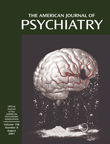To the Editor: I agree strongly with Dr. Quitkin and colleagues that atypical depression can well be conceptualized according to our spectrum model of the nonmelancholic disorders. In seeking to articulate the model in the article, I restricted examples to the two most consistently identified disorders (i.e., “anxious depression” and “irritable/hostile depression”) but suggested that other expressions must be presumed. In our current research, we included other personality styles (e.g., obsessional, introverted, impulsive) to examine the extent to which a meaningful definition of the nonmelancholic disorders involves respecting a temperament style diathesis. Atypical depression is a useful candidate as its (DSM-IV) criteria include “a long-standing pattern of extreme sensitivity to perceived interpersonal rejection,” as well as a set of “atypical” depressive features.
The Columbia group’s initial observations and their validation efforts are another excellent example of the importance of building on clinical observation to identify intrinsic depressive types instead of using the homogenizing approach of modeling depression on a dimensional paradigm. In addition to undertaking further phenomenological and validation studies, the world might nevertheless appreciate their deriving a better name for this interesting syndrome.
Dr. Benazzi reports me somewhat incorrectly, as I actually stated that “those with bipolar disorder have been reported to be distinctly more likely to have melancholic and psychotic expressions of depression when in a depressed phase” (p. 1199) and referenced both Goodwin and Jamison
(1) and one of our own studies
(2) in support. The latter compared 83 bipolar and 904 unipolar patients on respective rates for (current) psychotic depression (N=16, 19.3%, versus N=90, 10.0%, respectively) and for DSM-III-R-defined melancholic depression (N=57, 68.7%, versus N=334, 36.9%). Thus, only 10 of our bipolar patients (12.0%), compared to 480 of our unipolar patients (53.1%), might have been presumed to have nonmelancholic depression.
I commented on Dr. Benazzi’s study group elsewhere
(3). None of his subjects were receiving medication (which calls into question the illness severity of his group), the minimum duration criterion for hypomania in DSM-IV was not respected, and melancholic status was not formalized by use of DSM-IV or another criteria set. Instead, his prevalence data are in regard to unspecified melancholic “features”; the previously mentioned factors limit their interpretation.
Researchers (and clinicians) have long been concerned about the problematic diagnosis and differential diagnosis of bipolar II disorder. As bipolar I and II may or may not be independent conditions, there are advantages to conducting research studies with consideration of the disorders both in combination and separately.
Although patients with bipolar disorder appear highly likely to develop psychotic and melancholic expressions of depression, as with any generalization, there are exceptions. Thus, while I managed the treatment of a patient with bipolar disorder across many episodes of classic melancholic depression, she once appeared with a distinctly different clinical picture—a more reactive depressive disorder that appeared in response to her husband’s desertion. Although we concede that there may be exceptions, the possibility that bipolar depression is highly likely to be of the melancholic type allows an indirect approach to defining the nature of melancholia in more refined study groups.

